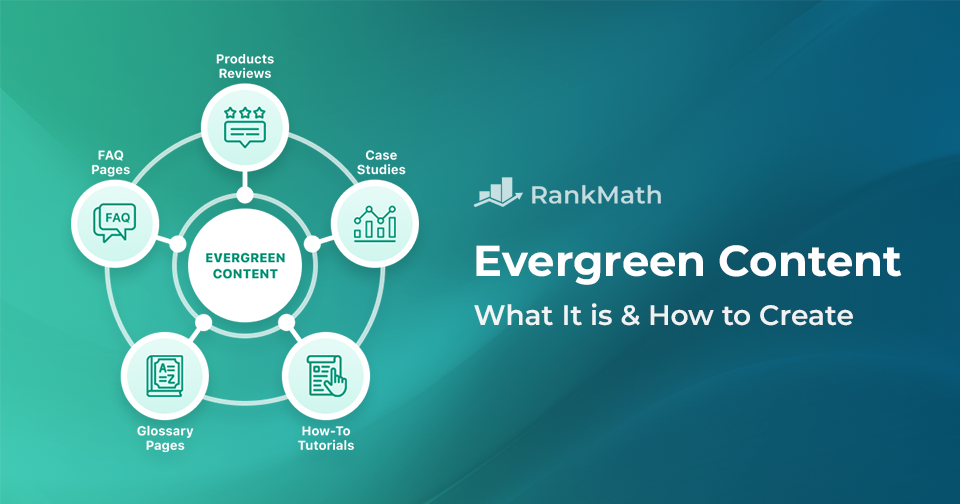Nowadays, most articles have a short shelf life. Trends fade, news gets outdated, and traffic spikes often disappear as quickly as they come.
But some content continues to drive traffic, generate leads, and provide value, long after it’s published. That’s the power of evergreen content.
Evergreen content stays relevant over time. It answers timeless questions, solves persistent problems, and remains useful to your audience for months—or even years.
In this post, we’ll break down what evergreen content really is, why it’s essential for long-term success, and how you can create high-performing evergreen pieces that work hard for your website, day in and day out.
So, without any further ado, let’s get started.

Table Of Contents
1 What is Evergreen Content and Its Benefits?
Evergreen content remains relevant and valuable to the audience over an extended period.
As mentioned before, its key characteristic is its timeless nature, meaning it doesn’t become outdated quickly like news or trending topics. Instead, it continues to provide value to the audience long after its initial publication.
Evergreen content comes in several types, each designed to provide lasting value to the audience.
- How-To Guides: Step-by-step instructions on achieving a goal or task, like How to Start a Blog or How to Create a Budget.
- Listicles: Easy-to-digest lists such as 10 Tips for Healthy Eating or 7 Ways to Boost Your Productivity.
- Comprehensive Guides: In-depth resources covering a topic thoroughly, like The Ultimate Guide to Digital Marketing or Complete Beginner’s Guide to Investing.
- FAQs: Address common questions on a topic, providing quick answers to reader inquiries, such as How often should I exercise? or What are the best foods for muscle recovery?
- Case Studies/Success Stories: Real-life examples showcasing how others have achieved success, offering inspiration and practical insights for the audience.
Benefits of Evergreen Content
A key benefit of evergreen content is its role in establishing authority within a particular niche. By consistently producing high-quality, timeless content, a brand or individual can position themselves as a go-to resource for valuable information.
Moreover, evergreen content provides significant SEO benefits. Search engines prioritize content that remains relevant and valuable to users, often ranking evergreen pieces higher in search results.
Evergreen content offers long-term value by continuing to generate leads, engagement, and conversions over an extended period. Once created, it requires minimal maintenance compared to news or seasonal content, making it a cost-effective investment for businesses.
2 How to Create Evergreen Content
Let us now discuss how to create evergreen content.
2.1 Identify Evergreen Topics
First, focus on your audience’s needs. Before selecting a topic, ensure you understand what your audience regularly searches for or struggles with.
Evergreen content is most effective when it addresses ongoing problems or answers frequently asked questions. For example, a topic like Effective Time Management Techniques is always helpful, no matter the year or season.
You can use Content AI to perform topic research. AI is helping 34% of users generate more creative content ideas, and 44% spend less time on planning.

Secondly, look for evergreen keywords with consistent search volume over time, indicating ongoing interest in the topic. For instance, keywords like how to lose weight or home organization tips consistently attract search traffic, making them ideal candidates for evergreen content.
Additionally, aim for topics with broad appeal within your niche to ensure sustained interest and engagement.
Lastly, consider topics that lend themselves to evergreen content formats, such as how-to guides, lists, or comprehensive resources, ensuring their relevance for years to come.
2.2 Perform Keyword Research
Performing keyword research is an important step in creating evergreen content. By understanding which keywords have consistent search volume over time, you can identify topics that are likely to remain relevant and valuable to your audience in the long term.
To begin, use keyword research tools such as Google Keyword Planner, Semrush, or Ahrefs to identify potential evergreen keywords within your niche. These tools allow you to search for keywords related to your topic and view their search volume, competition, and trends over time.
Refer to our dedicated tutorial on the best free keyword research tools and choose the one that best suits your needs.
Start by entering broad terms or topics related to your niche into the keyword research tool.
For instance, if you run a fitness blog, you might start with terms like weight loss, exercise, or healthy eating. The tool will then generate a list of related keywords and metrics, such as search volume and competition.
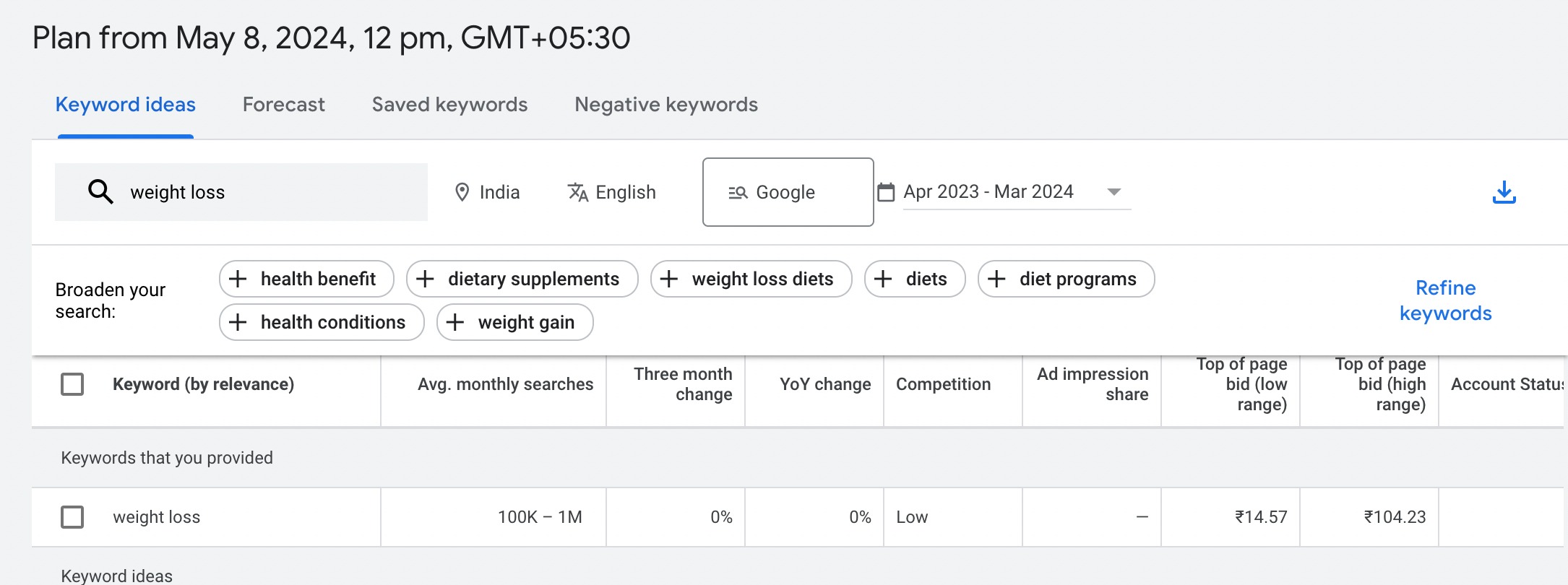
Look for keywords that have maintained a relatively steady level of interest, indicating ongoing demand for information on those topics. For example, keywords like the best way to lose weight or healthy recipes are likely to have consistent search volume year-round, making them suitable candidates for evergreen content.
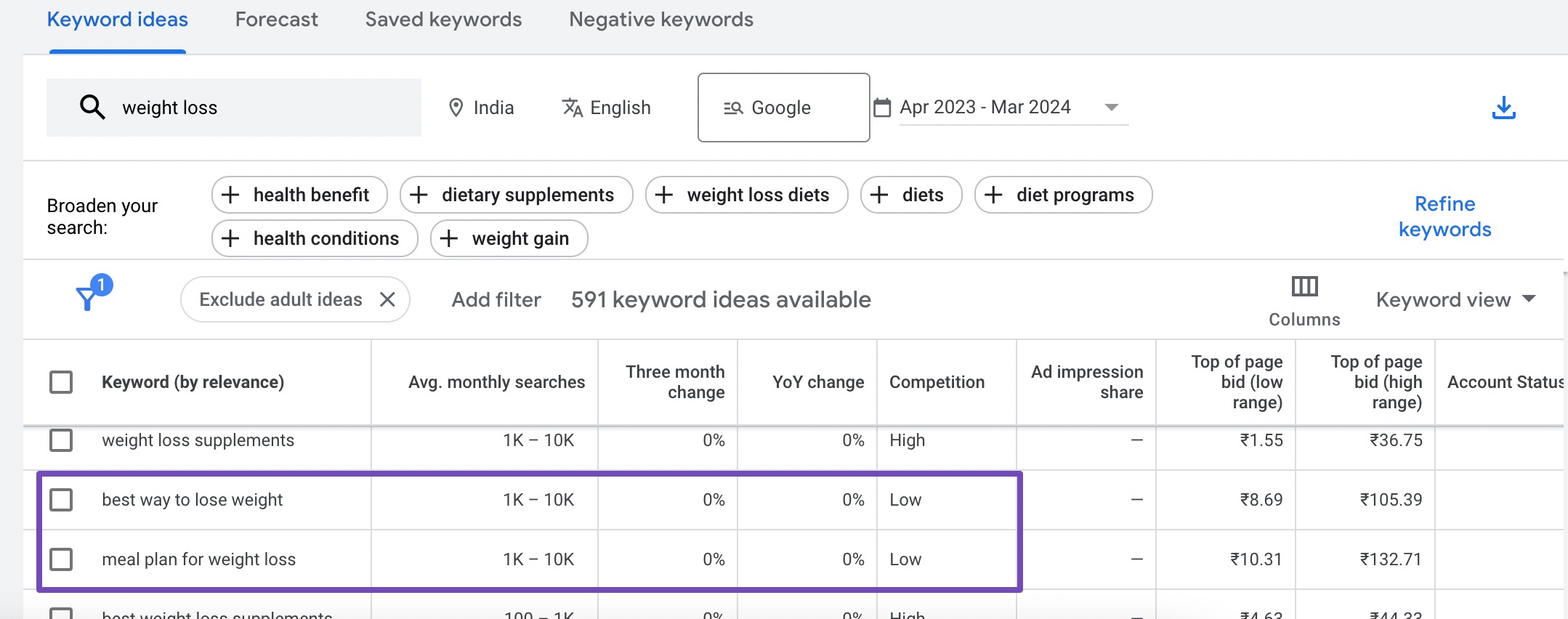
Once you’ve identified potential evergreen keywords, consider how you can include them in your content strategy.
2.3 Choose Your Content Format
Selecting the right content format is essential when creating evergreen content.
Identify Your Audience Preferences
Consider the preferences of your target audience when choosing a content format. Are they more likely to engage with lists, how-tos, guides, case studies, or FAQs?
Understanding your audience’s preferences and search intent will help you create content that resonates with them.
For instance, if you’re targeting busy professionals who prefer quick and actionable advice, a listicle format like 10 Timeless Productivity Hacks for Busy Professionals might be more appealing than a lengthy guide.
With Rank Math PRO’s Search Intent feature, you can easily align your content with the correct search intent. The Show Intent label beside your primary keyword instantly displays its intent, helping you optimize effectively.
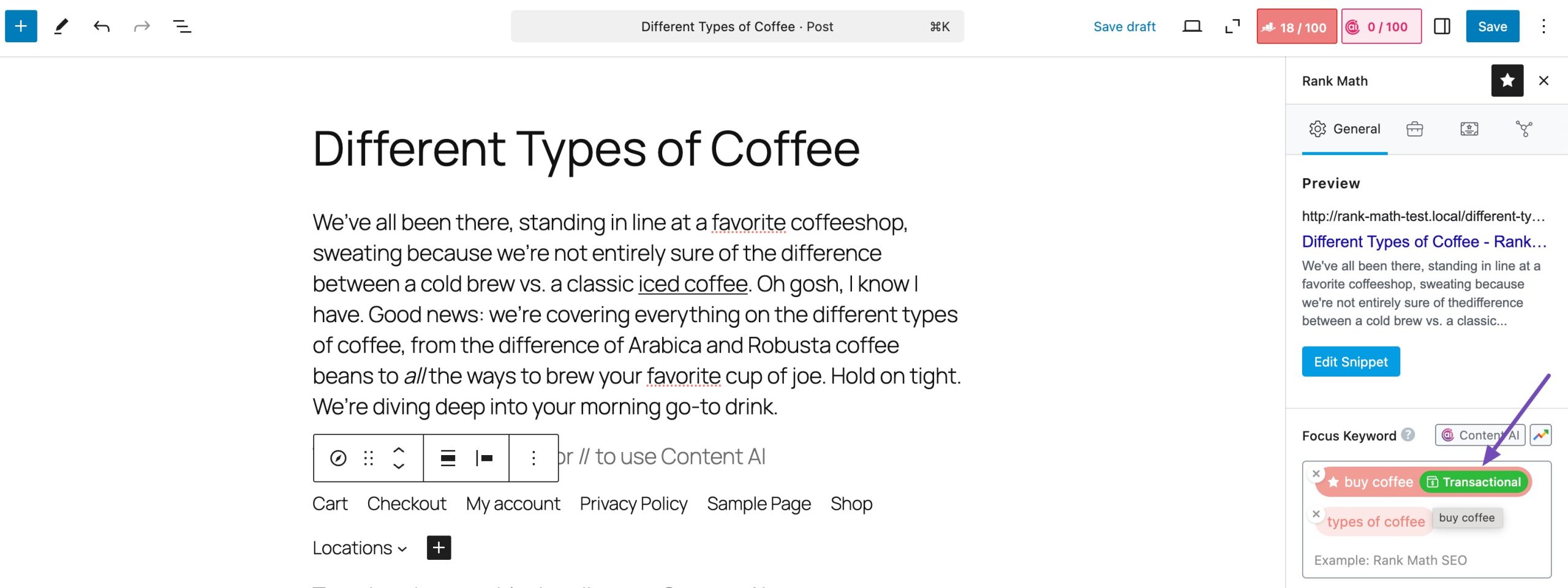
Match the Format to Your Topic
Certain topics lend themselves better to specific content formats. For example, how-to guides are perfect for practical topics that require step-by-step instructions, while lists are ideal for organizing information in a digestible format.
For instance, if you’re writing about Healthy Eating Habits you can create a how-to guide on How to Meal Prep for a Week or a listicle on 10 Healthy Snacks for Busy Days.
2.4 Create Evergreen Content
Once you’ve your format ready, it’s time to create evergreen content.
Writing Compelling Headlines and Introductions
Compelling headlines and introductions are essential for grabbing audiences’ attention and encouraging them to engage with your content.
Start by creating headlines that clearly convey the value of your content and intrigue readers to learn more.
For example, instead of Ways to Improve Your Cooking, a more compelling headline can be 10 Timeless Cooking Techniques Every Home Chef Should Master.
Similarly, introductions should hook readers by addressing their pain points or offering a promise of valuable information.
Refer to our dedicated tutorial on writing an introduction paragraph to write captivating introductions.
If you find it difficult to write an introduction, use our Blog Post Introduction AI tool to write one in just a few clicks. Enter the required fields and click the Generate button, and Content AI will generate your blog post introduction.
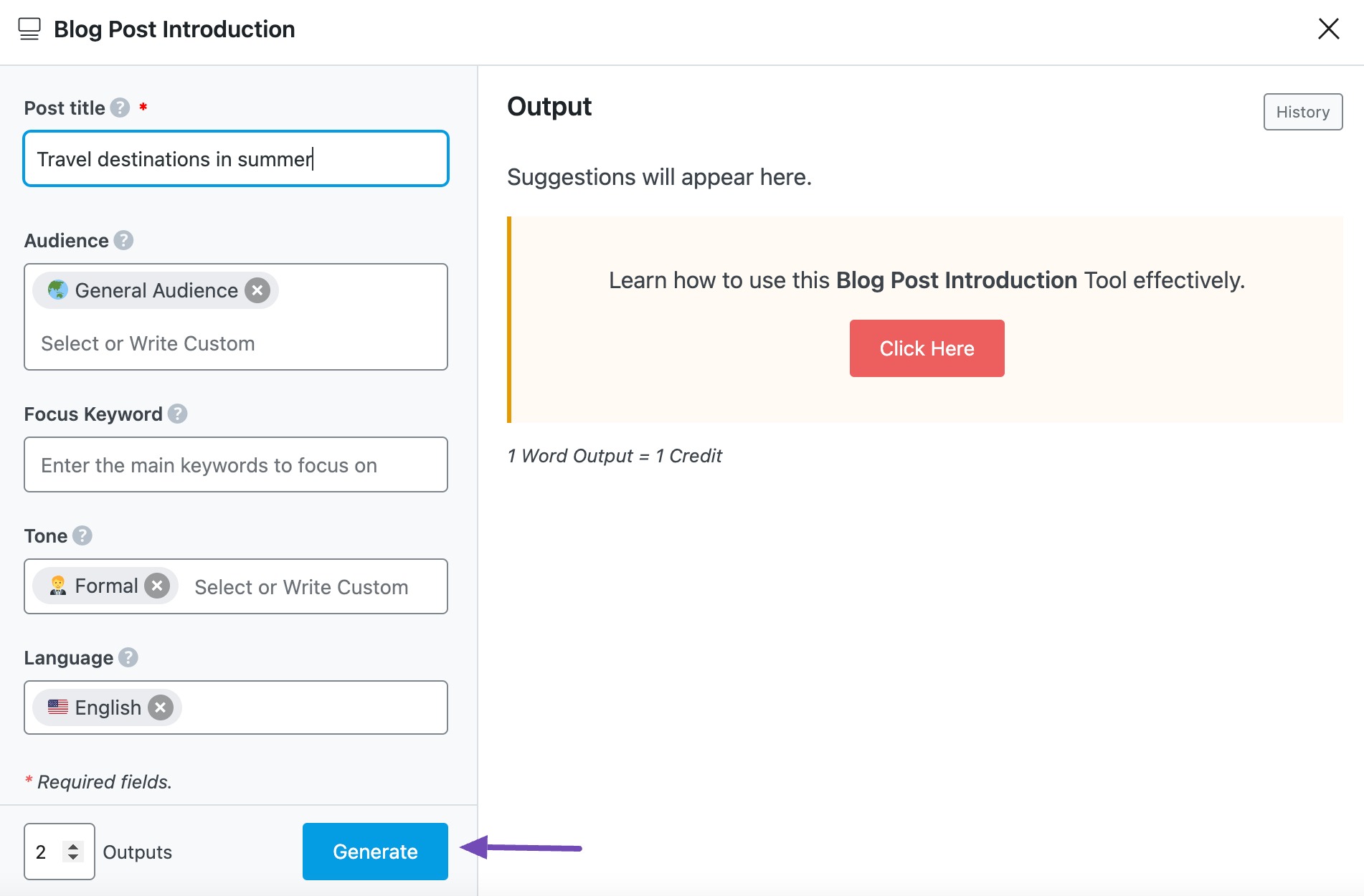
Structure Content for Longevity
Structuring your content in evergreen formats ensures its longevity and appeal to the audience over time.
These formats include lists, how-tos, guides, and FAQs.

For instance, a listicle titled Top 15 Money-Saving Tips for Families or a how-to guide titled How to Build a DIY Bookshelf in 5 Easy Steps are formats that remain relevant regardless of trends or seasons.
Structure your content to improve user experience and boost your site’s visibility in search engines.
Refer to our dedicated tutorial on website structure to organize your content effectively.
Analyze Competitor Content
Analyze your competitors’ content to research what types of evergreen content perform well in your niche.
Look for patterns in content formats that attract engagement and adapt them to fit your brand’s voice and style.
Refer to our dedicated tutorial on competitive analysis to stay ahead of your competitors in rankings.
Incorporate Evergreen Keywords and SEO Best Practices
Integrate evergreen keywords naturally into your content to improve its search visibility and longevity. Focus on keywords that have consistent search volume and relevance to your topic.
For instance, if you’re writing a guide on Budgeting for Beginners, include keywords like personal finance tips, money management, or saving money.
You can use Content AI to write your evergreen content in one click.
Ensure that your content follows SEO best practices, such as using descriptive meta tags, optimizing images, and including internal and external links to authoritative sources.
2.5 Add Visual Enhancements
In addition to choosing the right content format, adding visual enhancements can significantly enhance the effectiveness and appeal of your evergreen content.
Including high-quality images, graphics, and illustrations can make your evergreen content more engaging and visually appealing. Use images that complement your text and help convey key points or concepts.
For instance, here’s how Semrush includes infographics in their content to make it more appealing.
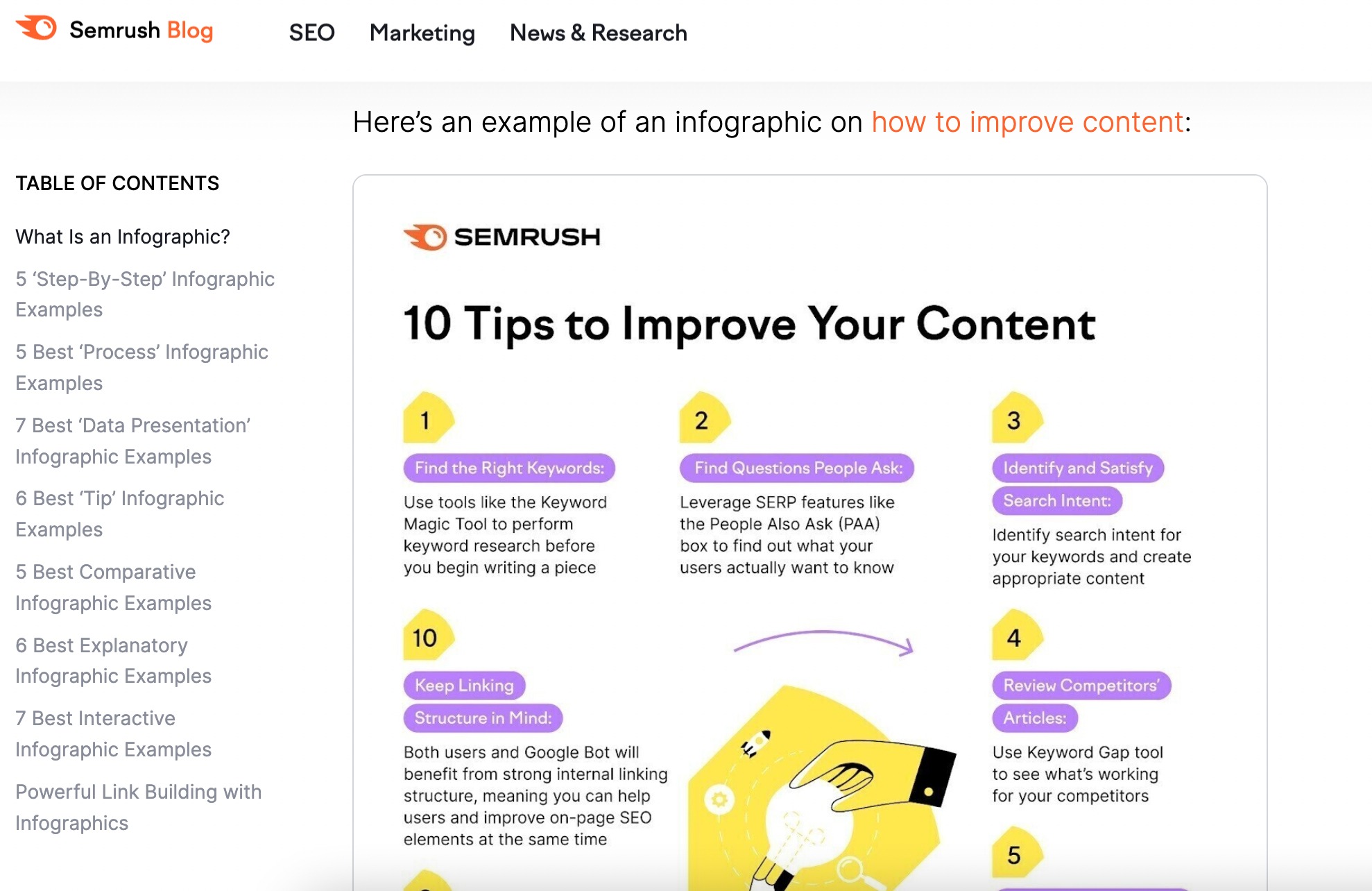
Use videos to demonstrate techniques, showcase products, or provide additional context to your written content.
3 Update and Maintain Evergreen Content
To ensure your evergreen content remains relevant and valuable over time, regular content audits are important to identify outdated information, broken links, or changes in best practices.
By staying informed about industry trends and developments, you can update your content to reflect the latest information and maintain its accuracy.
This includes refreshing statistics and data and updating headlines and introductions to keep them engaging for current readers.
Monitoring the performance of your evergreen content is equally important for identifying areas that may need improvement or updates. Tracking key metrics such as page views, bounce rates, and conversion rates can provide insights into how your content is performing and where adjustments may be needed.
Analytics tools like Google Analytics provide insights into user behavior and engagement, allowing you to make data-driven decisions about your content strategy.
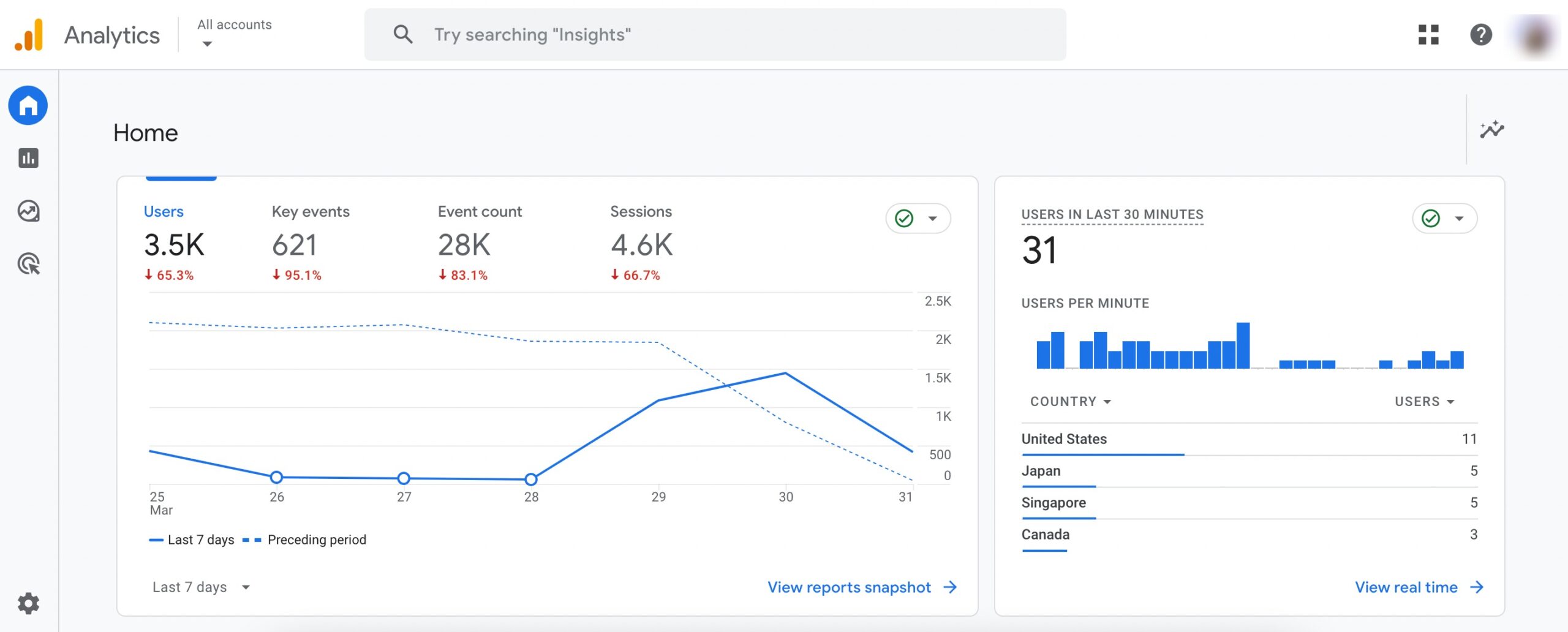
Engaging directly with your audience on social media and community platforms helps you gather feedback and understand their interests and preferences, enabling you to iterate and improve your content continuously.
4 Frequently Asked Questions
What types of content work best as evergreen content?
Guides, how-to articles, tutorials, FAQs, glossaries, definitions, and foundational resources are common examples of effective evergreen content.
Can evergreen content still be updated?
Yes. Evergreen content should be updated periodically to keep information accurate, improve rankings, and maintain freshness without changing the core topic.
How do I choose topics for evergreen content?
Choose topics with steady search demand, long-term relevance, and problems your audience will continue to face over time.
Can evergreen content lose rankings over time?
Yes, if it’s not maintained. Competitors, outdated information, or search intent shifts can affect rankings, which is why regular updates matter.
5 Conclusion
Evergreen content stands out as a timeless and valuable asset for businesses.
Integrating evergreen content into your content strategy can turn it into a powerhouse that continuously drives growth with every content you publish.
Remember that it’s not just about capturing the momentary attention of your audience but also about providing lasting value that continues to attract and engage readers long after the initial publication.
With the right approach and dedication to quality, evergreen content can become a cornerstone of your content strategy, driving traffic, establishing authority, and building lasting relationships with your audience.
If you like this post, let us know by Tweeting @rankmathseo.
